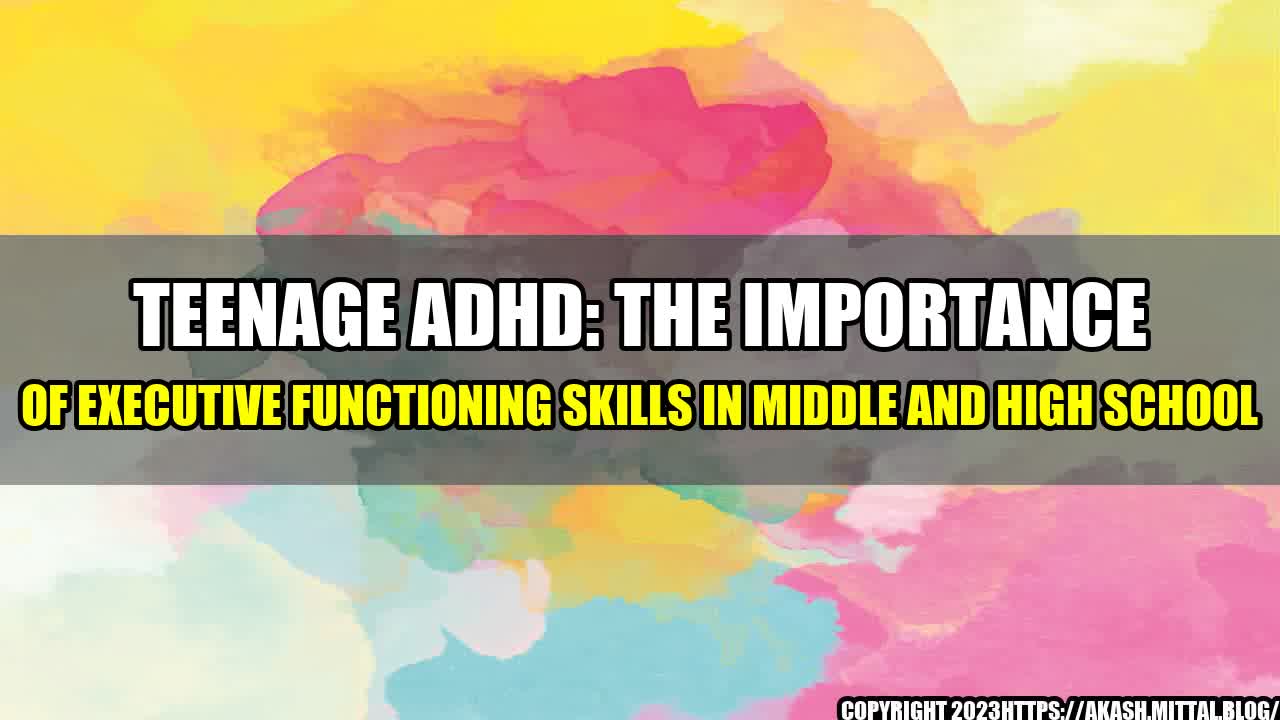
Imagine it's Monday morning and your teenage daughter wakes up late for school yet again. She had stayed up until the early hours of the morning studying for a test, but forgotten to set her alarm. Rushing to get ready, she forgets her lunch and leaves her phone at home. On the bus ride to school, she realizes she left her homework on her desk. All the while, she's feeling overwhelmed and anxious about the day ahead.
For teenagers with ADHD, mornings like this are not uncommon. The challenges they face are rooted in deficits in executive functioning skills. These skills are the building blocks for managing time, organizing and prioritizing tasks, setting goals and achieving them, and regulating emotions and behavior. They are what allow us to process information and make informed decisions. Without these skills, even simple tasks like getting dressed in the morning can be incredibly difficult.
The impact of executive functioning problems in ADHD can be particularly significant for teenagers, who are navigating the complex demands of middle and high school. Deficits in these skills can result in poor academic performance, social isolation, and mental health issues such as anxiety and depression. In this article, we'll explore strategies for building executive functioning skills in teens with ADHD, and how these skills can make a big difference in their lives.
Quantifiable Examples
To truly understand the impact of executive functioning deficits in ADHD, consider the following examples:
- A 2020 study published in the Journal of Attention Disorders found that teens with ADHD who struggled with organization skills were more likely to have lower grades, difficulty completing homework, and higher levels of anxiety and depression.
- According to a 2018 review published in the Journal of Child Neurology, deficits in working memory (an important executive functioning skill) can lead to problems with reading comprehension and math skills in ADHD teens.
- Anecdotal evidence from parents and educators suggests that poor impulse control and decision making in teens with ADHD can lead to risky behaviors such as drug and alcohol use or unsafe sexual activity.
Teenage ADHD: The Key to Success in Middle and High School.
Strategies for Building Executive Functioning Skills
1. Use Visuals and Timers
Visual aids and timers can be incredibly helpful for teenagers with ADHD who struggle with time management and organization. Some specific strategies include:
- Using a timer or stopwatch to break tasks into smaller chunks, which can make them feel less daunting. For example, set a timer for 20 minutes of studying, followed by a five-minute break.
- Creating a visual schedule or to-do list for each day, which can provide structure and help keep teens on track.
- Using color coding and other visual cues to make information easier to process and remember. For example, use one colored folder for math work, and another for science.
2. Teach Goal-Setting and Planning Skills
Teaching teens with ADHD how to set goals and make plans is key for building executive functioning skills. Some strategies include:
- Working with teens to set achievable short-term and long-term goals. For example, a short-term goal might be to complete math homework before dinner, while a long-term goal could be to get a good grade on an upcoming exam.
- Breaking down larger goals into smaller, manageable tasks. For example, if the long-term goal is to get a good grade on an exam, the smaller tasks might include studying for 20 minutes each day, reviewing notes, and practicing problem-solving.
- Providing checklists and other tools to help teens track their progress and monitor their success.
3. Build Self-Regulation Skills
Developing self-regulation skills, such as self-awareness and emotional control, is crucial for teens with ADHD. Strategies include:
- Encouraging teens to practice mindfulness and other relaxation techniques to manage stress and anxiety.
- Helping teens identify their own emotional triggers and develop strategies for coping with them. For example, a teen who gets angry when they feel overwhelmed might learn to take a short break and go for a walk.
- Providing positive reinforcement and support when teens exhibit positive behavior. For example, a parent might praise their teen for staying on task, rather than criticizing them for being distracted.
Conclusion
Teens with ADHD face unique challenges in middle and high school, particularly in managing time, organizing and prioritizing tasks, and regulating emotions and behavior. Building executive functioning skills can help them succeed academically, socially, and emotionally. Strategies for building these skills include using visuals and timers, teaching goal-setting and planning skills, and developing self-regulation skills. By taking a proactive approach to building executive functioning skills, teenagers with ADHD can overcome their challenges and thrive in school and in life.
Reference URLs and Hashtags:
1. #ADHDSkills
2. #TeenagersWithADHD
3. #ManagingADHD
4. #ExecutiveFunctioningSkills
5. #ADHDEducation
6. #ADHDHelp
7. #ADHDAwareness
8. https://www.additudemag.com/help-adhd-teens-thrive-high-school/
9. https://www.researchgate.net/publication/344932104_Structural_and_executive_function_differences_in_adolescents_with_ADHD_and_a_history_of_trait_impulsivity_and_risk-taking
10. https://www.sciencedirect.com/science/article/abs/pii/S1750946720301723
11. Category: ADHD and Education.
Curated by Team Akash.Mittal.Blog
Share on Twitter Share on LinkedIn